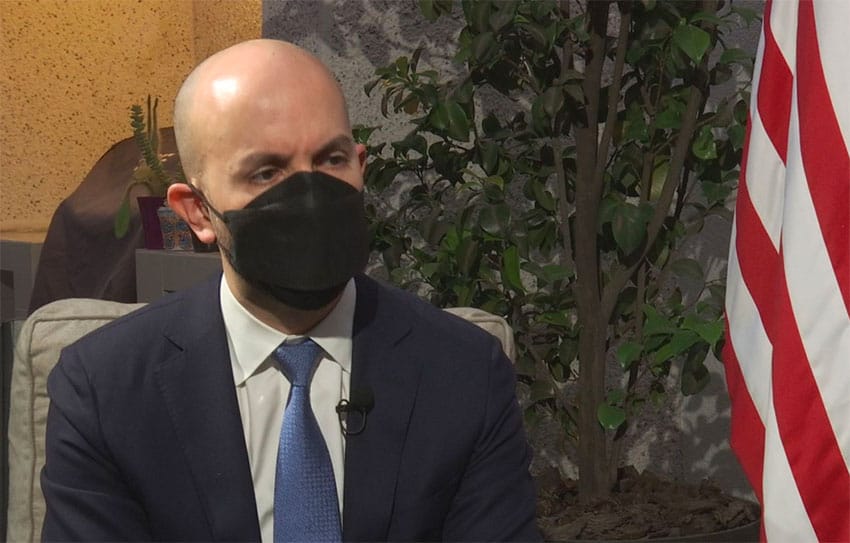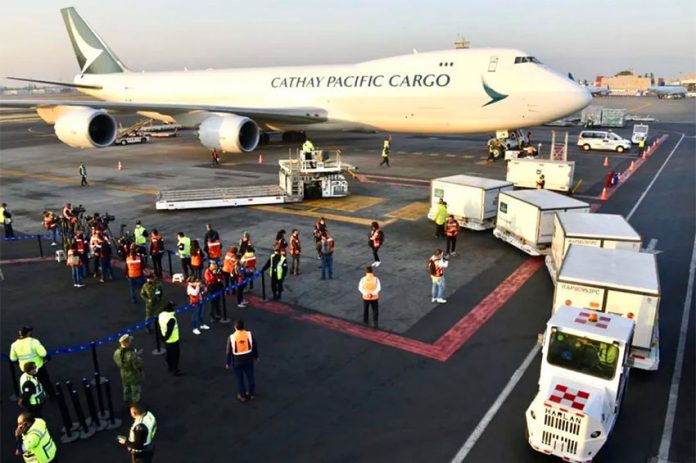A senior United States official has warned Mexico to be wary of Covid-19 vaccines delivered by China and Russia because they are motivated by their own political interests.
Juan S. González, the top diplomat on western hemisphere affairs on the White House National Security Council, told the newspaper Milenio that there might be geopolitical calculations and specific interests behind the delivery of vaccines from those countries.
Mexico has a deal with Russia to purchase 24 million doses of its Sputnik V vaccine and agreements to buy 35 million doses from Chinese companies Sinovac Biotech and CanSino Biologics. The Russian vaccine was developed by a state-owned research institute but the Chinese shots were developed by private companies.
Asked to explain why China and Russia appear to have more interest in supplying vaccines to Mexico than the United States – which announced last week that it would loan 2.5 million AstraZeneca doses to Mexico – González responded:
“There is a great difference here. [On] one [side there] is vaccine diplomacy in exchange for political capital while for us the motivation is the wellbeing of the Mexican people.”

He also warned that China and Russia might not deliver all the doses they have promised.
The United States’ assistance doesn’t come with conditions, González added. The most important thing from the U.S. government’s point of view is the prosperity and safety of Mexicans, he said.
(A first shipment of 1.5 million AstraZeneca shots from the U.S. will arrive Sunday, Foreign Minister Marcelo Ebrard said Thursday.)
González also said that in contrast with other countries, Washington’s focus in distributing vaccines internationally is not commercial.
“We’re obviously focused on recovery [from the pandemic] in the United States but we’re also focused on the entire world with an emphasis on Latin America,” he said, adding that the Biden administration has donated US $4 billion to the intergovernmental Covax initiative, which aims to ensure rapid and equitable access to vaccines for all countries.
Probed further as to why the Mexican government should be wary of vaccine supply from China and Russia, González said:
“I would say that Mexicans have to decide what’s in their interest. We’re betting that there will be very close collaboration between the United States and Mexico in the future. That’s the relationship we’re looking for with Mexico, one of mutual interest. Not one in which we try to intimidate, threaten or gain a benefit for ourselves at the expense of the Mexican people.”
The official said that he couldn’t make any announcement about whether the United States would supply more vaccine doses to Mexico beyond the 2.5 million to which it has already committed but asserted that the U.S. government has a “North American plan” to combat the pandemic.
“… It’s not just vaccines, it’s the medical system and how we’re sharing information, how we’re developing vaccines, not those of today but those of tomorrow,” González said, adding that the U.S. government is also collaborating with its Mexican counterpart on border issues so that the pandemic can be controlled “without sacrificing our economic collaboration.”
He agreed that a “healthy North America” is not possible without the pandemic being controlled in Mexico, the United States and Canada.
“The president [Joe Biden] obviously made a promise to the American people that we’re going to vaccinate Americans [first]. Once we’ve done that, the focus will be on how we can help the rest of the world combat this pandemic, but that entire conversation begins in North America and that’s why the first announcement about sharing vaccines was with Canada and Mexico,” he said.
Responding to González’s remarks on Thursday, President López Obrador said that in order to obtain Covid-19 vaccines, it’s necessary to engage with all countries that could supply them.
López Obrador, who described Russian president Vladimir Putin as “genuinely affectionate” after reaching the Sputnik V supply deal in January, told reporters at his morning press conference in Campeche that “universal fraternity must prevail over hegemonies” in matters that affect people’s health.
“When it comes to obtaining vaccines to protect people we have to interact with everyone and seek solidarity and universal fraternity,” he said.
Mexico has so far received just under 9.76 million vaccine doses, according to data presented by the Health Ministry on Wednesday night, of which about 4.55 million, or 47% of the total, were manufactured in Europe by United States pharmaceutical company Pfizer.
Sinovac has supplied 3 million doses, 940,470 CanSino shots have arrived and a shipment of 870,000 AstraZeneca doses manufactured in India reached the country last month. Only 400,000 of the expected 24 million Sputnik V doses have arrived to date.
As of Wednesday night, 6.1 million vaccine doses had been administered in Mexico, mainly to health workers and seniors. According to The New York Times vaccinations tracker, 4.2% of Mexico’s population are vaccinated and 0.4% are fully vaccinated, meaning that they have received both required doses of two-shot vaccines.
Source: Milenio (sp)
